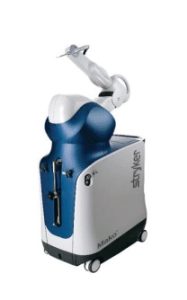Discover 5 truths about robot assisted total knee surgery your surgeon might not share openly. Gain a deeper understanding before making this important medical decision.
- The most commonly used robotic system (Makoplasty) uses an implant that was designed 20 years ago and has undergone very little design improvement since that time. During those 20 years, there has been a significant advancement in our understanding of the mechanics and kinematics of knee replacement and how they impact soft tissue stability, especially as patients demand more physically from their implants.
- Robotically assisted knee replacements are not less invasive as many sites suggest. They require the same surgical exposure and actually require additional pins to be drilled into the bone so that the robot can communicate with the knee.
- Robotically assisted knee replacements do not necessarily lead to more rapid improvement. The assertion that they can be done with fewer soft tissue releases is not unique to robotic total knees. The exact same techniques can be used in a conventional knee replacement to minimize soft tissue release. The protocol for recovery after a robotic total knee is exactly the same in terms of immediate range of motion and symptom-based activity progression.
- There is limited non-biased, prospective, comparative data that fairly proves that robotically assisted total knees have better outcomes. In fact, there is an abundance of literature that shows very little difference in functional outcomes between traditional and robotic knees.
- The contention that robotics leads to better precision when putting the implant in is only relevant if the appropriate target is selected. Precision and accuracy are two very different things. It is possible to be precisely inaccurate when putting an implant in so if the surgeon relies on erroneous information to plan the implant placement, they can be led astray by the technology.
Many would argue that robotic assistance can make an average surgeon better but not add any significant value to a good surgeon who already has mastery of the nuances of arthritic knees, implant design and what it takes to accomplish the goals of restoring motion, stability and function. These are not cookie-cutter operations. The eyes, hands and judgement of an experienced surgeon are what lead to the best chance of a well-done total knee. Curation and management of the entire process of surgery is much more important than technology that focuses only on the surgery. Our AVATAR program customizes not just the procedure but the entire journey from preoperative assessment to postoperative recovery. Experience the difference.
















